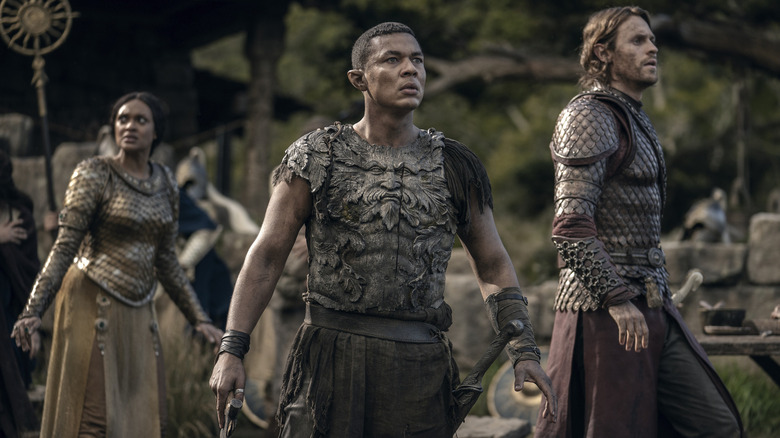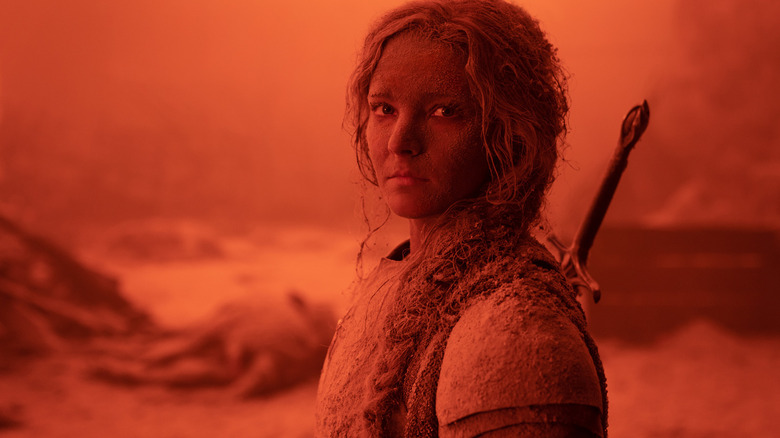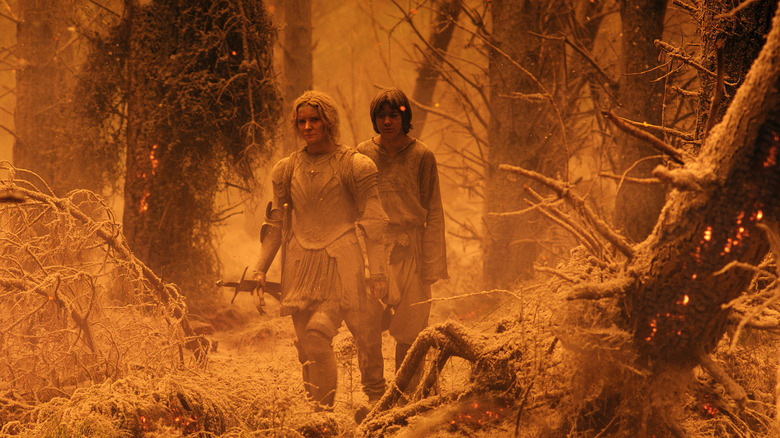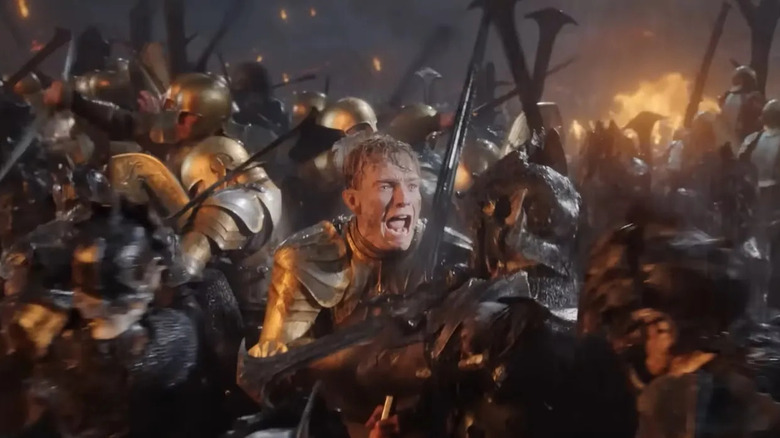The Rings Of Power Does What Peter Jackson's Movies Never Did, And Show The Horrors Of War
"The Lord of the Rings" movies are truly something miraculous, a fantasy adventure unlike any other in cinema. They tell a tale of hope and friendship, one set in a world that feels real and lived-in, which captures and — in some areas — even improves on Tolkien's work. Somehow, it even became a global hit, an awards season juggernaut, and a pop culture moment.
One of the things the trilogy did so well was give us fantasy battles of epic proportions, each with its own mini three-arc structure, and even their own technology to help bring the scale of the fight to the screen. From the incomparable Battle of the Hornburg to the grandiose Battle of Pelennor Fields, few movies manage to hit the action or emotional chords the way the fight scenes in Peter Jackson's trilogy does.
And yet, "The Rings of Power" has already shown us elements of battle the movies never did. Peter Jackson did a commendable job of making the sight of Aragorn slaughtering dozens upon dozens of orcs an incredibly thrilling sight, while also showing the human cost of sending every available body, including children, to war.
But the Prime Video show is taking things a step further. First, last week's episode showed a battle scene that was gnarlier and more brutal than anything in the films, a true shocking affair that reflected the carnage Tolkien himself experienced in real war. Now, we get a proper portrayal of the aftermath of a battle, one where it becomes clear that in war there are no winners, only widows.
A hellish affair
Last week saw a huge battle in the Southlands, where the forces of Adar attacked the townsfolk, tricking them into killing their own kin and slaughtering many of them, all before triggering an intricate set of tunnels that eventually cause the eruption and creation of Mount Doom.
This week's episode, "The Eye," opens with the aftermath of the eruption, with the survivors reeling from the armageddon they witnessed. From the very beginning, "The Rings of Power" makes it clear this is a truly hellish situation. Sure, the carnage and destruction was actually caused by a volcano, not by battle, but still, we had never seen the aftermath of a Middle-earth battle depicted like this before. The whole episode has a melancholic tone to it, one that makes it clear war is nothing to be excited about, that there is nothing here but tragedy and mourning.
There are hundreds of dead and wounded, the latter in horrible ways as we see later in the episode; there is constant screaming, and every scene set in the Southlands is tinted in bloody red.
This hits extremely close to Tolkien's writing, which never really portrayed battles as romantic or exciting, but tragic and bloody. When the books talk about heads being catapulted into the city, it probably wasn't the goal to make you say "badass."
No meaningless slashing
It makes sense that Tolkien would not glorify battle. After all, the professor served in the British army during the Battle of the Somme in World War I, and seeing many of his friends and most of his battalion get killed deeply affected him and his writing.
When writing "The Lord of the Rings," Tolkien avoids focusing on the violence, and spends more time writing about poems and songs being told as the hobbits walk than describing the movement of battalions or the swinging of swords. There is rather little description of gore in the books. Instead, we get plenty of detail about the cost of battles and their aftermath. We read about the bloodstains on Gimli's clothes after a battle, of the scars Merry got from orcs, or the arrows that pierced Boromir's chest. What seemed to matter to Tolkien was not the battle itself, but its cost and the effect it has on both individuals and in nations. In one of his letters, Tolkien complained about attempts to adapt his work wanting to add "yet one more scene of screams and rather meaningless slashings."
The brutality of war
Now, "Rings of Power" is following that lead by showing not only the brutality of war, but its futility and horror. Sure, the battle of the Southlands looked cool, and seeing the Númenóreans arrive to save the day at the last minute was a great nod to a tradition from the movies and books, but it is also fascinating to see the show not shy away from showing how awful war truly is.
As the show continues to get closer and closer to the many tragedies that marked the Second Age of Middle-earth, let's hope the Prime Video show remembers Tolkien's approach to battle as much as it does the impact Peter Jackson's movies had on the audience.
"The Rings of Power season 1 finale debuts on Prime Video on October 14, 2022.



